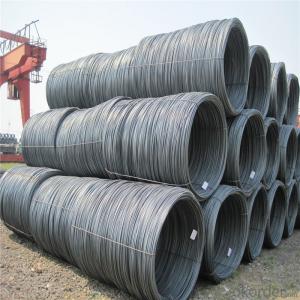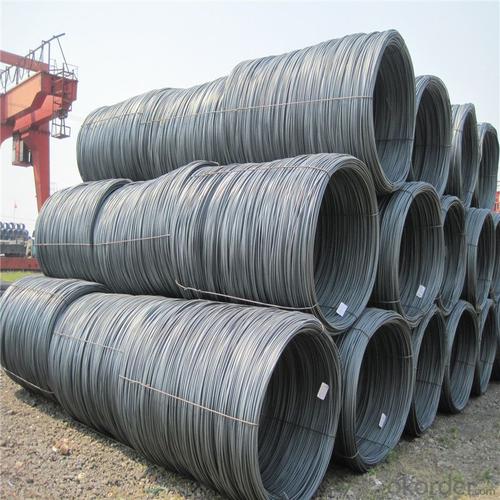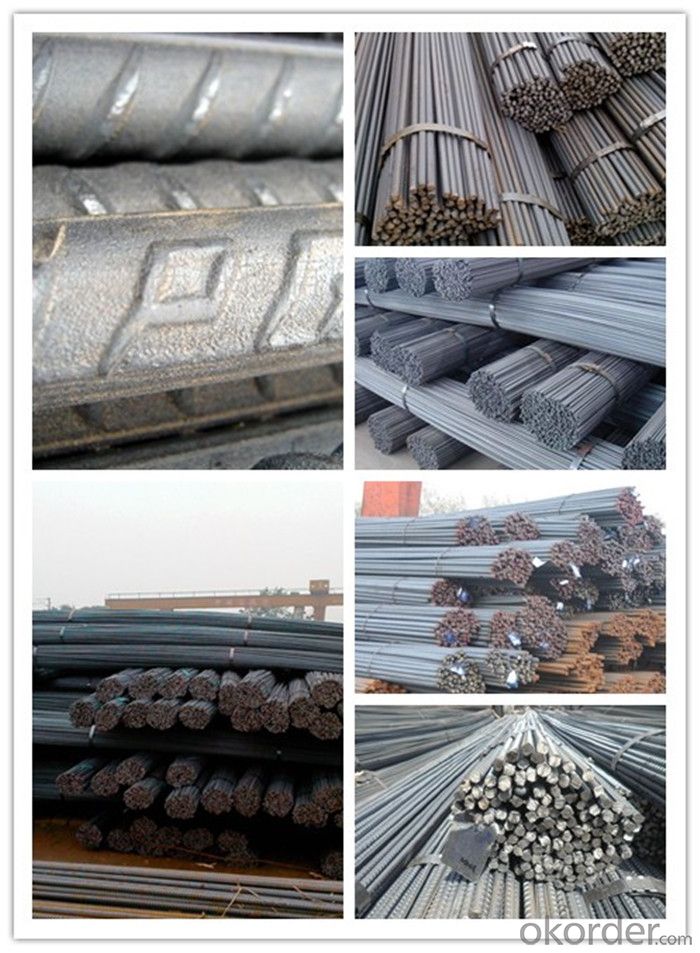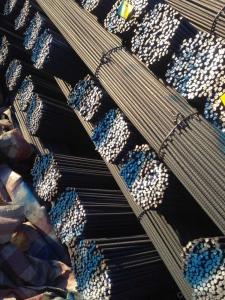Bs Standard Rebar En Standard Import Bars
- Loading Port:
- Tianjin
- Payment Terms:
- TT OR LC
- Min Order Qty:
- 100 m.t.
- Supply Capability:
- 50000 m.t./month
OKorder Service Pledge
OKorder Financial Service
You Might Also Like
Specification
Bs Standard Rebar En Standard Import Bars
Description of Bs Standard Rebar:
1, Diameter: 5.5mm-10mm rounds reinforcing steel bar
10m- 40 rods reinforcing Bs Standard Rebar
2, Length: 6m, 9m, 12m or customized
3, Standard: GB, ASTM, AISI, SAE, DIN, JIS, EN
OEM technology - send detailed technical parameters for accurate quotation.
2, Produce Process: smelt iron - EAF smelt billet - ESR smelt billet -
hot rolled or forged to get the steel round bar and plate
3, Heat Treatment: annealing, normalizing, tempering, quenching
4, Surface Treatment: Black
5, Quality Assurance: We accept third party inspection for all orders.
You can ask testing organizations such as SGS, BV, etc. to test our products before shipping.
Chemical Composition of Bs Standard Rebar:
Grade | Technical data of the original chemical composition(%) | |||||
Reinforcing steel bar HRB335 | C | Mn | Si | S | P | B |
≤0.25 | ≤1.60 | ≤0.80 | ≤0.045 | ≤0.045 | >0.0008 | |
Physics Capability | ||||||
Yield Strength(N/cm2) | Tensile Strength(N/cm2) | Elongation(%) | ||||
≥ 335 | ≥490 | ≥16 | ||||
Reinforcing steel bar HRB400 | C | Mn | Si | S | P | B |
≤0.25 | ≤0.16 | ≤0.80 | ≤0.045 | ≤0.045 | 0.04-0.12 | |
Physics Capability | ||||||
Yield Strength(N/cm2) | Tensile Strength(N/cm2) | Elongation(%) | ||||
≥ 400 | ≥ 570 | ≥ 14 | ||||
Product Show of Bs Standard Rebar:
Company Information:
CNBM International Corporation is the most important trading platform of CNBM group.
Whith its advantages, CNBM International are mainly concentrate on Cement, Glass, Iron and Steel, Ceramics industries and devotes herself for supplying high qulity series of refractories as well as technical consultancies and logistics solutions.

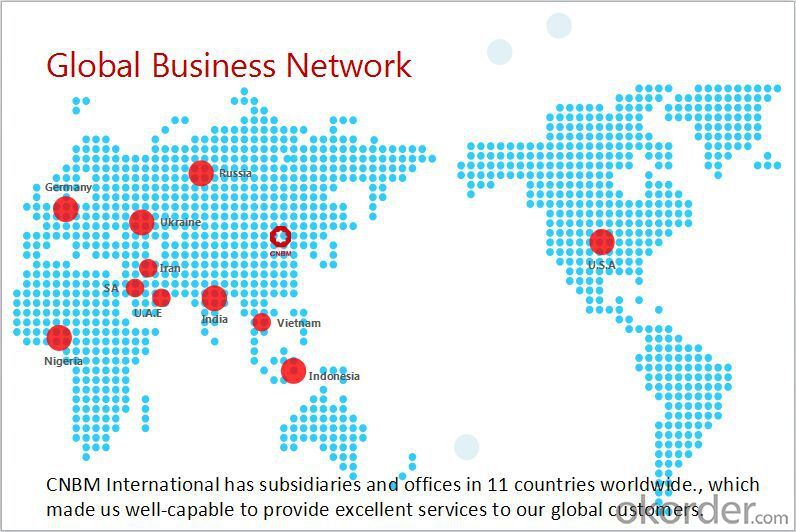
FAQ:
1, Your advantages?
professional products inquiry, products knowledge train (for agents), smooth goods delivery, excellent customer solution proposale
2, Test & Certificate?
SGS test is available, customer inspection before shipping is welcome, third party inspection is no problem
3, Factory or Trading Company?
CNBM is a trading company but we have so many protocol factories and CNBM works as a trading department of these factories. Also CNBM is the holding company of many factories.
4, Payment Terms?
30% TT as deposit and 70% before delivery.
Irrevocable L/C at sight.
5, Trading Terms?
EXW, FOB, CIF, FFR, CNF
6, After-sale Service?
CNBM provides the services and support you need for every step of our cooperation. We're the business partner you can trust.
For any problem, please kindly contact us at any your convenient time.
We'll reply you in our first priority within 24 hours.
- Q: What is the role of special steel in the oil and gas industry?
- Special steel plays a crucial role in the oil and gas industry as it is used for various applications that require high strength, corrosion resistance, and durability. It is extensively used in the construction of pipelines, offshore platforms, drilling equipment, and storage tanks. Special steel ensures the integrity and reliability of these critical components, enabling safe and efficient operations in the challenging and harsh environments of the oil and gas industry.
- Q: Can special steel be used in the appliance manufacturing industry?
- Yes, special steel can be used in the appliance manufacturing industry. Special steels, such as stainless steel or high-strength steel, offer various advantages such as corrosion resistance, durability, and enhanced mechanical properties. These qualities make them suitable for manufacturing appliances that require high performance, such as refrigerators, ovens, or washing machines. Additionally, special steels can be customized to meet specific design requirements and can contribute to the overall aesthetic appeal of the appliances.
- Q: What are the main factors affecting the hardness of special steel?
- There are several main factors that influence the hardness of special steel. 1. Carbon content: One of the key factors is the carbon content in the steel. Carbon is a hardening element that increases the strength and hardness of the steel. Higher carbon content typically results in higher hardness. 2. Alloying elements: The presence of alloying elements such as chromium, manganese, nickel, and tungsten also affects the hardness of special steel. These elements form various compounds and solid solutions, which can enhance the hardness and strength of the steel. 3. Heat treatment: The heat treatment process, which involves heating and cooling the steel, significantly impacts its hardness. Quenching, a rapid cooling process, can increase the hardness by transforming the steel's microstructure. Tempering, on the other hand, can reduce hardness while improving toughness. 4. Crystal structure: The crystal structure of the steel can influence its hardness. For example, martensite, a hard and brittle structure formed during quenching, provides high hardness. Other crystal structures like ferrite or pearlite may have lower hardness. 5. Grain size: The size of the grains in the steel's microstructure can affect its hardness. Smaller grain sizes generally result in higher hardness due to improved strength and reduced dislocation movement within the material. 6. Work hardening: The process of plastic deformation, such as rolling or forging, can increase the hardness of steel. This work hardening occurs as dislocations in the crystal lattice get trapped and hinder further dislocation movement, resulting in increased hardness. 7. Impurities and inclusions: The presence of impurities or non-metallic inclusions in the steel can affect its hardness. These impurities can act as stress concentrators and reduce the hardness of the material. It is important to consider these factors and carefully control them during the manufacturing process of special steel to achieve the desired hardness for specific applications.
- Q: How does special steel perform in high-impact applications?
- Special steel has been specifically designed to excel in high-impact applications, showcasing unique properties that allow it to withstand extreme forces and impacts without deforming or breaking. Notably, one of the standout features of special steel is its exceptional strength and hardness, enabling it to effectively absorb and distribute impact forces. Consequently, this prevents the material from shattering or deforming under heavy loads, rendering it highly suitable for applications such as construction machinery, automotive parts, and industrial equipment. Furthermore, special steel exhibits outstanding toughness, enabling it to resist cracking or fracturing when subjected to sudden and intense impacts. This quality proves crucial in high-impact applications where the material must endure repeated forces without failure. The toughness of special steel is achieved through meticulous alloying and heat treatment processes, which significantly enhance its energy absorption capacity and fracture resistance. Moreover, special steel often possesses superior properties such as wear resistance, corrosion resistance, and heat resistance, all of which contribute to its overall performance in high-impact applications. These heightened characteristics allow the material to maintain its integrity and functionality even when exposed to harsh environments or extreme temperatures. In conclusion, special steel showcases exceptional performance in high-impact applications as a result of its remarkable strength, toughness, wear resistance, corrosion resistance, and heat resistance. These properties establish it as a reliable and durable choice for industries requiring materials capable of withstanding intense forces and impacts.
- Q: Can special steel be used in the production of springs for automotive suspension?
- Yes, special steel can be used in the production of springs for automotive suspension. Special steel, such as alloy steel or high-carbon steel, offers excellent strength, durability, and resistance to fatigue, making it suitable for handling the heavy loads and constant vibrations involved in automotive suspension systems.
- Q: How does special steel perform in high-temperature applications?
- Special steel performs exceptionally well in high-temperature applications due to its unique properties. It exhibits excellent strength, hardness, and resistance to heat, oxidation, and corrosion at elevated temperatures. Special steel maintains its mechanical properties even in extreme conditions, allowing it to withstand high temperatures without deformation or failure. Its high thermal conductivity ensures efficient heat transfer, making it suitable for applications such as gas turbines, nuclear reactors, and aerospace components. Overall, special steel is a reliable and durable material choice for high-temperature environments.
- Q: How does special steel contribute to the pharmaceutical aftermarket industry?
- Special steel plays a significant role in the pharmaceutical aftermarket industry by providing high-quality materials for manufacturing critical components such as machinery, equipment, and tools. The unique properties of special steel, such as corrosion resistance, strength, and durability, ensure the production of efficient and safe pharmaceutical products. Additionally, special steel's ability to withstand extreme temperatures and pressures enables the creation of advanced processing systems, leading to improved efficiency and productivity in pharmaceutical manufacturing.
- Q: What are the main characteristics of corrosion-resistant castings?
- The main characteristics of corrosion-resistant castings include the ability to withstand exposure to corrosive environments without degradation or rusting, high resistance to chemical attack, excellent durability, and long-lasting performance. These castings are typically made from materials such as stainless steel, nickel-based alloys, or other corrosion-resistant alloys, which provide enhanced resistance against oxidation, pitting, and crevice corrosion. Additionally, corrosion-resistant castings often possess good mechanical properties, including high strength and hardness, making them suitable for applications in industries such as marine, oil and gas, chemical processing, and wastewater treatment.
- Q: Can special steel be used in extreme weather conditions?
- Yes, special steel can be used in extreme weather conditions. Specialized steel alloys such as stainless steel or weathering steel are designed to withstand harsh environments, including extreme temperatures, high humidity, corrosive elements, and exposure to UV radiation. These steels offer enhanced durability, resistance to corrosion, and excellent structural integrity, making them suitable for various applications in extreme weather conditions.
- Q: How does special steel resist thermal fatigue?
- Special steel is able to resist thermal fatigue due to its unique composition and properties. Thermal fatigue occurs when a material is subjected to repeated heating and cooling cycles, leading to the formation of cracks and eventual failure of the material. Special steel is specifically designed to withstand extreme temperature changes. It has a high melting point and excellent thermal conductivity, which allows it to efficiently dissipate heat and minimize thermal stress. Additionally, the steel is often alloyed with elements such as chromium, nickel, and molybdenum, which enhance its resistance to thermal fatigue. The alloying elements in special steel form a protective layer that acts as a barrier against oxidation and corrosion. This protective layer prevents the formation of cracks and improves the steel's ability to withstand thermal cycling. Furthermore, the alloying elements improve the steel's structural integrity by promoting the formation of fine and evenly dispersed microstructures. This enhances the steel's toughness and resistance to cracking. Moreover, special steel undergoes various heat treatment processes to further enhance its resistance to thermal fatigue. These processes involve controlled heating and cooling cycles, which refine the microstructure of the steel and make it more resistant to deformation and cracking. The heat treatment also helps in relieving any residual stresses that may have been induced during the manufacturing process. In summary, special steel resists thermal fatigue through its unique composition, alloying elements, and heat treatment processes. Its high melting point, excellent thermal conductivity, and protective layer against oxidation and corrosion make it highly resistant to thermal cycling. The refined microstructure and relieved residual stresses further enhance its ability to withstand repeated heating and cooling cycles without failure.
Send your message to us
Bs Standard Rebar En Standard Import Bars
- Loading Port:
- Tianjin
- Payment Terms:
- TT OR LC
- Min Order Qty:
- 100 m.t.
- Supply Capability:
- 50000 m.t./month
OKorder Service Pledge
OKorder Financial Service
Similar products
Hot products
Hot Searches
Related keywords
